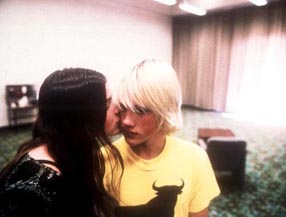
|
ElephantBy Chris HydeJanuary 27, 2004
In his latest film, Gus Van Sant takes on the legacy of Columbine. This ambitious movie certainly has its moments, but its depiction of the nature of modern tragedy eventually stumbles to a close. When a pair of high school students decided to shoot up their Colorado high school in April of 1999, the entire nation held its breath in wonder. Here was the moment that many had long feared - where the alienation and violence that lurks in some teenagers' souls exploded in a brutal firestorm of blood and fear. In the wake of the horror, finger pointing pundits and so-called experts filled the airwaves with simple explanations that generally reduced the incident to plain old black and white; the kids were raised poorly, they played violent videogames, they were steeped in bloody movies, and they easily procured weapons inside America's permissive marketplace. Now, filmmaker Van Sant examines the incident with a fictional film that heavily draws on real world history and utilizes a vision that is far more ambiguous than that put forth by the prior blathering of these media wags. The director's film takes an interesting approach that blends documentary technique with an artistic eye; though the day-to-day lives of the students are presented with a somewhat realist sensibility, the floating camerawork, slo-mo moments and time stretching narrative lend the story an almost poetic air. Replacing the mountainous geography of the area where the mass killings actually took place with the damp confines of Portland, Oregon, Elephant proceeds initially to take us inside a similar school and introduce us to the denizens of a place fated to be torn asunder by the end of the piece. The film's perspective is cryptic from the first; for a long time it's utterly unclear whether the characters that you are meeting will be killers or victims. The opaqueness of the director's presentation of the story here has caused it to come under some criticism from those who believe that the lack of moralistic tone in the film leads to a product in which there is no right and no wrong. For my part, I believe this to be inaccurate; for the positive element in this style is to allow the audience to judge for itself where good and evil need to sit. However, Van Sant's sometimes cavalier blending of fiction and reality isn't deep or self-aware enough for the film to be a true bargain between spectator and film wherein it's the audience's judgment that completes the film at last. In fact, some of the filmmaker's choices (such as using the actors' real names as the names of their characters or aiming for cinema verite moments that are quasi-documentary in form) seem in fact to be pretty cheap tricks meant to enhance the "truth" being shown on screen. Unfortunately, to these eyes the result of this is that portions of the film come off as pretty insincere in their attempt to get at the true nature of incidents such as this one. There are other missteps along the way that lessen the final impact of Elephant. The seemingly required nods to Nazism and first person shooter games are so obvious that they seem almost disposable; in fact the computer game that one of the killers plays looks so boring that it wouldn't hold any adolescent's attention for more than a couple minutes. (Far more effective as an allusion to videogames are the behind-the-character tracking shots that oft make the film appear like the audience is playing a third-person type of game). Also questionable are decisions like humanizing one of the shooters through having him spin out some Beethoven on the family's piano in a scene that I suppose was meant to be perversely ironic. Instead, this just comes off as a pretentious means of underlining the supposed complexity of the character and seems as much of an throwaway affectation as the moment of timid homosexuality that precedes the film's last act. Another choice that impedes the success of this movie are the bits of brutally overwrought and heavy-handed symbolism that mar its viewpoint; if the audience can't figure out what the gathering thunderclouds throughout are supposed to imply then people are a heck of a lot more na´ve than I'd like to think they are. (Though I'll certainly allow that it does indeed make for a nice visual). All of the disappointment detailed above should not be read as indicating that the movie is in any way an utter and complete failure; simply by tackling the subject Van Sant and HBO Films have made a valuable contribution to a societal discussion that has mostly been dominated by those pushing their own agendas or has otherwise been swept under the proverbial rug. Additionally, though the film's stylistic choices are at times distracting and its performances often uneven, there are still many moments here and there that shine through the murk. The filmmaker's languidly paced use of Harris Savides' excellent camerawork is quite beautiful at times, and the film's interesting manner of manipulating time to stretch out the tension is fascinating in its execution. It's just a shame that even given some nice attributes overall, with final analysis the movie proves an unsatisfying exercise whose lack of clarity is underlined by the "pick 'em" children's nursery rhyme that are the film's last words. In a better movie this choice would give the audience the chance to complete the film on their own and with their own moral viewpoint - but unfortunately here the finish is much more akin to a random coin flip than a moment that weds filmmaker to spectator. For all the parties that it takes to make a movie, ultimately that's more or less a letdown.
|
Thursday, January 08, 2026
© 2006 Box Office Prophets, a division of One Of Us, Inc.